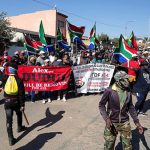Johannesburg – As South Africa eagerly awaits the outcome of the power-sharing discussions between the African National Congress (ANC), Democratic Alliance (DA), and Inkatha Freedom Party (IFP), exclusive documents obtained by Celeb Gossip News shed light on the ANC's internal deliberations and favored alliance. With the clock ticking towards the crucial June 16 deadline, the ANC is faced with the challenge of finding a viable solution to form a stable government.
The documents, tabled during the ANC National Executive Committee (NEC) talks, provide a rare glimpse into the party's possible direction and the various power-sharing models under consideration. Among the options, a Canadian- and Turkish-style "confidence and supply" agreement seems to be gaining traction as the most favorable choice. This arrangement would see the ANC retaining executive power, while the DA and IFP, potentially with the support of the Economic Freedom Fighters (EFF), would control the legislature.
Authored by a young, progressive intellectual within the ANC, Document 1 argues against a coalition agreement that would hinder the ANC's renewal and transformation agenda. It emphasizes the importance of prioritizing the long-term effects on both the ANC and the nation as a whole. The document further highlights the potential risks associated with including the EFF and Jacob Zuma's Party/uMkhonto Wesizwe Party (MKP) as coalition partners, as it could undermine the progress achieved by the ANC government thus far.
Notably, Document 1 strongly advocates for the ANC-DA-IFP power-sharing agreement, outlining three forms of power-sharing: a coalition government, a "confidence and supply" agreement, and a government of national unity. Among these options, the document rates the "confidence and supply" agreement as the preferred choice. Under this scenario, the ANC would retain executive power, potentially with positions for the IFP, while the DA would assume control of the legislature, including key positions such as the Speaker and important committee roles.
The ANC's interest in forming an alliance with the IFP stems from the positive rapport between the two parties' leaders. Such a partnership would allow them to rebuild their influence in KwaZulu-Natal, where they have faced significant setbacks due to the rise of the MK. The document predicts further defections in the province, signaling a potential shift in political dynamics.
Document 2, titled "Scenarios for a coalition government," delves deeper into the concept of a "confidence and supply" agreement. It defines this arrangement as a formal agreement between political parties, wherein supporting parties pledge their votes in exchange for policy concessions or involvement in the legislative process. This type of agreement becomes crucial in situations where the ruling party lacks an outright majority in the legislature, ensuring the government's survival during critical votes.
The supporting parties, in this case possibly the DA and IFP, would commit to voting with the government on significant issues such as the Budget and confidence motions. In return, they would negotiate specific policy commitments aligned with their respective agendas. The document emphasizes that such agreements provide stability to minority governments while reflecting a broader range of interests beyond the governing party.
Besides considering the power-sharing models, the ANC must also address key policy differences with potential partners. Contentious issues such as black economic empowerment, land restitution and expropriation, and foreign policy divergences could pose significant challenges during the negotiations. The ANC's commitment to economic inclusion and the DA's skepticism towards certain policies create a delicate balancing act for both parties to find common ground.
ANC member Matsobane Ledwaba, together with four experts, authored Document 3, which presents five scenarios for power-sharing. The document emphasizes that despite the ANC's loss in certain provinces, it remains the largest party in South Africa, securing a significant share of the vote. It urges ANC leaders to carefully navigate the sponsored media narratives and funded organizations seeking regime change, cautioning that each coalition option carries its advantages and disadvantages.
As the ANC rushes against the clock to finalize its positions and engage in talks with potential partners, the nation eagerly anticipates the outcome of these power-sharing discussions. With only 13 calendar days remaining to reach a consensus, the ANC faces the daunting task of balancing its policy priorities while forming a stable government that addresses the pressing needs of the country.
South Africa holds its breath as the ANC, DA, and IFP engage in high-stakes negotiations that could shape the future of the nation. The outcome of these discussions will undoubtedly reverberate throughout the political landscape, impacting the lives of millions of South Africans. Stay tuned for more updates on this unfolding political drama, only at Celeb Gossip News.

Follow Us on Twitter










